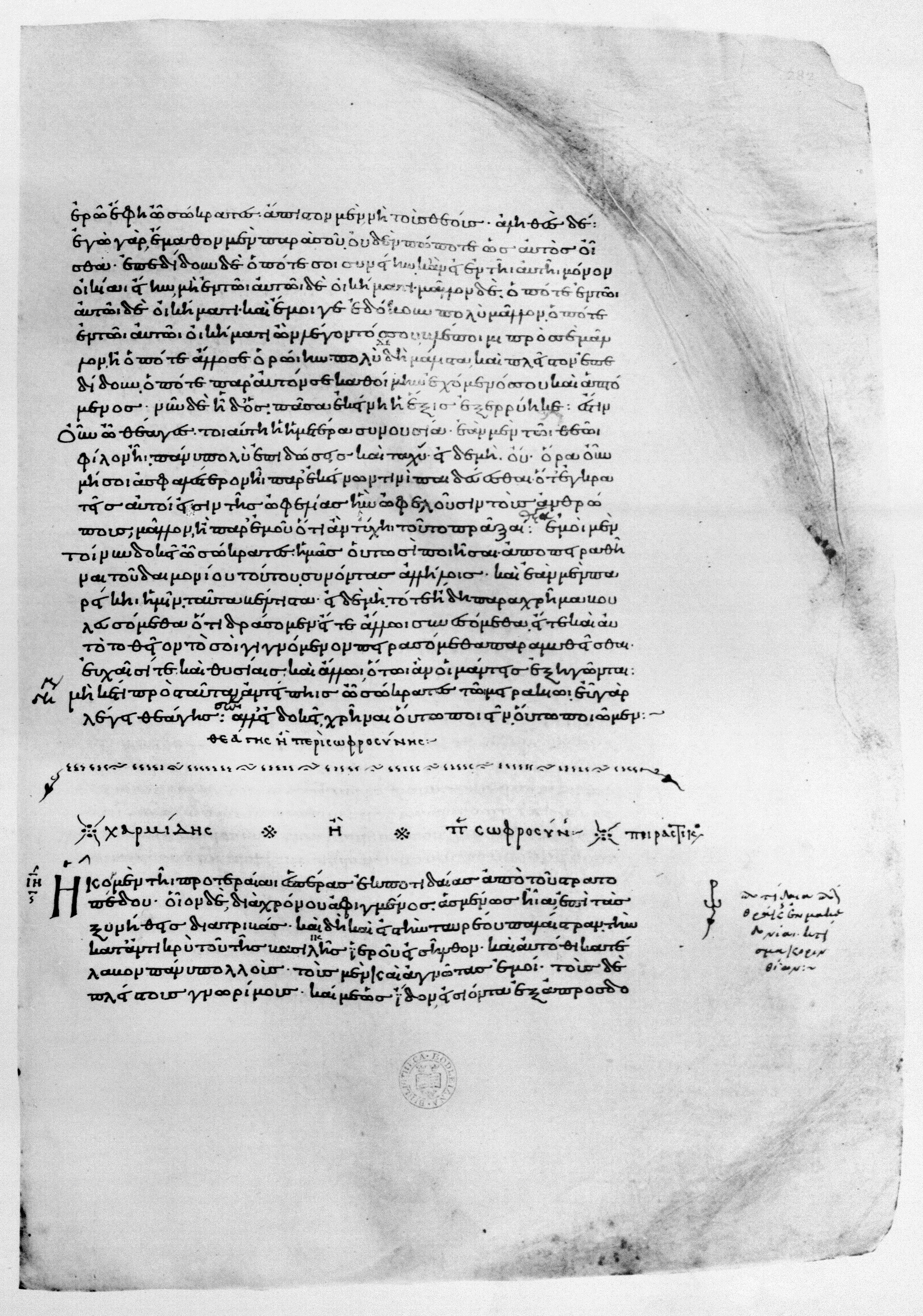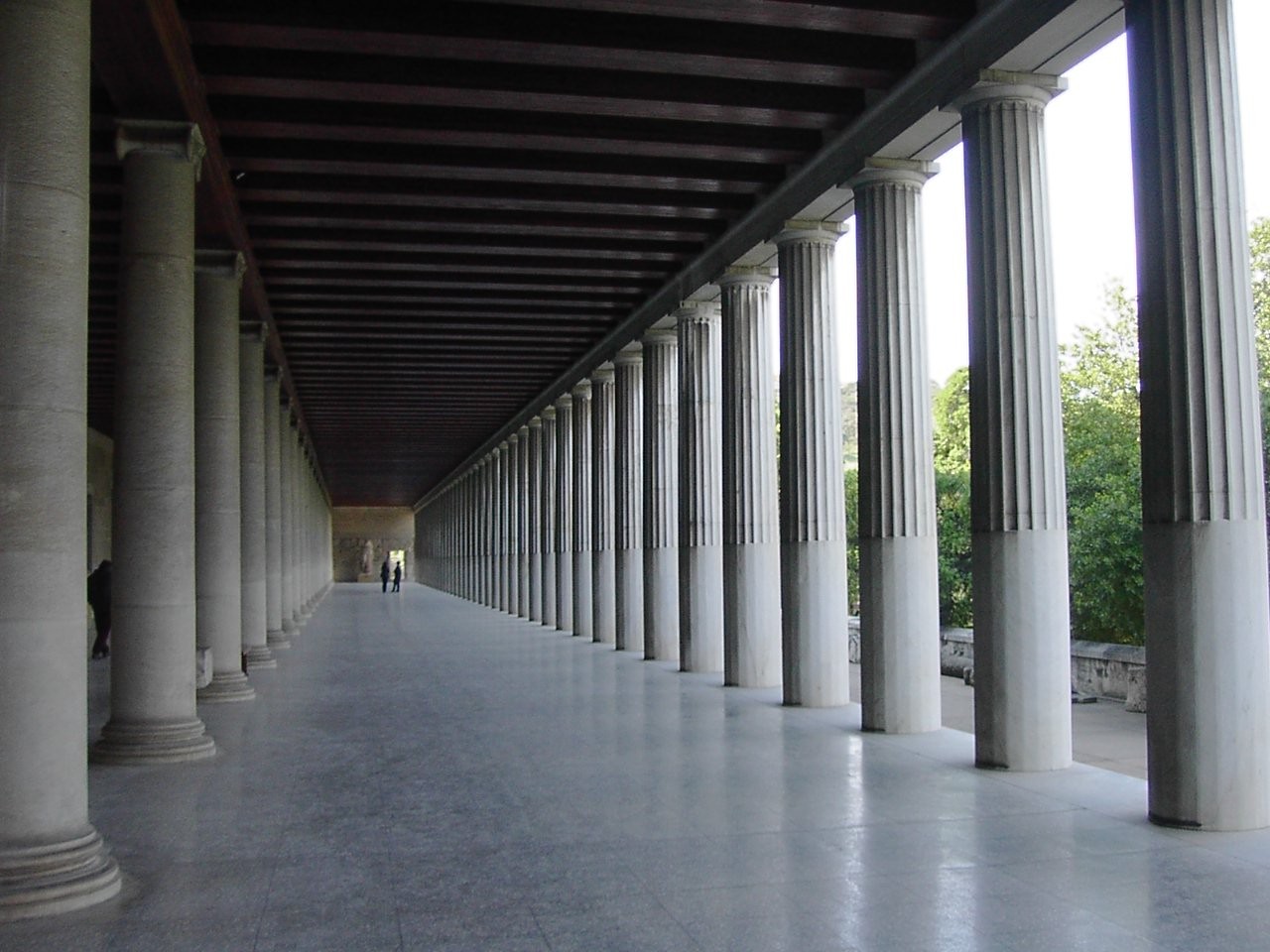|
Chaerephon
Chaerephon (; , ''Chairephōn''; c. 470/460 – 403/399 BCE), of the Athenian deme Sphettus, was an ancient Greek best remembered as a loyal friend and follower of Socrates. He is known only through brief descriptions by classical writers and was "an unusual man by all accounts", though a man of loyal democratic values. Life Chaerephon is mentioned by three writers of his time, all of whom were probably well acquainted with him: Aristophanes, Xenophon, and Plato. Considered together, these sources suggest that Chaerephon was a well-known, alert, energetic, engaging individual, possibly with a distinctive physical appearance and probably a bit of a "character", who moved easily in the social and intellectual circles of the day. In Aristophanes Chaerephon appears in three of Aristophanes' comic plays: '' The Clouds'', ''The Wasps'', and '' The Birds''. ''The Clouds'', produced in 423 BCE, portrays Socrates and his assistant Chaerephon as a pair of charlatans operating a pseudo-s ... [...More Info...] [...Related Items...] OR: [Wikipedia] [Google] [Baidu] |
Apology (Plato)
The ''Apology of Socrates'' (, ''Apología Sokrátous''; ), written by Plato, is a Socratic dialogue of the Testimony#Law, speech of History of the legal profession#Ancient Greece, Rome and Byzantine Empire, legal self-defence which Socrates (469–399 BC) spoke at his Trial of Socrates, trial for impiety and corruption in 399 BC. Specifically, the ''Apology of Socrates'' is a Defense (legal), defence against the charges of "corrupting the youth" and "Asebeia, not believing in the gods in whom the city believes, but in other ''daemon (classical mythology), daimonia'' that are novel" to Classical Athens, Athens (24b). Among the primary sources about the trial and death of the philosopher Socrates, the ''Apology of Socrates'' is the dialogue that depicts the trial, and is one of four Socratic dialogues, along with ''Euthyphro'', ''Phaedo'', and ''Crito'', through which Plato details the final days of the philosopher Socrates. There are debates among scholars as to whether we sho ... [...More Info...] [...Related Items...] OR: [Wikipedia] [Google] [Baidu] |
Charmides (dialogue)
The ''Charmides'' (; ) is a dialogue of Plato, in which Socrates engages a handsome and popular boy named Charmides in a conversation about the meaning of ''sophrosyne'', a Greek word usually translated into English as "Temperance (virtue), temperance," "self-control," or "restraint." When the boy is unable to satisfy him with an answer, he next turns to the boy's mentor Critias. In the dialogue, Charmides and then later Critias champion that Temperance is "doing one's own work" but Socrates derides this as vague. The definition given next of know thyself, "knowing oneself" seems promising but the question is then raised if something can even have the knowledge of itself as a base. As is typical with Platonic early dialogues, the two never arrive at a completely satisfactory definition, but the discussion nevertheless raises many important points. The ''Charmides'' is one of Plato's most Homoeroticism, homoerotic dialogues. Socrates admires Charmides' beauty at the beginning of th ... [...More Info...] [...Related Items...] OR: [Wikipedia] [Google] [Baidu] |
The Clouds
''The Clouds'' (, ''Nephelai'') is a Greek comedy play written by the playwright Aristophanes. A lampooning of intellectual fashions in classical Athens, it was originally produced at the City Dionysia in 423BC and was not as well received as the author had hoped, coming last of the three plays competing at the festival that year. It was revised between 420 and 417BC and was thereafter circulated in manuscript form. No copy of the original production survives, and scholarly analysis indicates that the revised version is an incomplete form of Old Comedy. This incompleteness, however, is not obvious in translations and modern performances. Retrospectively, ''The Clouds'' can be considered the world's first extant "comedy of ideas" and is considered by literary critics to be among the finest examples of the genre. The play also, however, remains notorious for its caricature of Socrates, and is cited by Plato in the ''Apology'' as a contributing factor to the philosopher's trial a ... [...More Info...] [...Related Items...] OR: [Wikipedia] [Google] [Baidu] |
Gorgias (dialogue)
''Gorgias'' (; ) is a Socratic dialogue written by Plato around 380 BC. The dialogue depicts a conversation between Socrates and a small group at a dinner gathering. Socrates debates with self-proclaimed rhetoricians seeking the true definition of rhetoric, attempting to pinpoint the essence of rhetoric and unveil the flaws of the sophistic oratory popular in Athens at the time. The art of persuasion was widely considered necessary for political and legal advantage in classical Athens, and rhetoricians promoted themselves as teachers of this fundamental skill. Some, like Gorgias, were foreigners attracted to Athens because of its reputation for intellectual and cultural sophistication. Socrates suggests that he (Socrates) is one of the few Athenians to practice true politics (521d). Dramatis personae * Socrates * Gorgias * Polus * Callicles * Chaerephon Major themes Definition of rhetoric Socrates interrogates Gorgias to determine the true definition of rhetoric, framing ... [...More Info...] [...Related Items...] OR: [Wikipedia] [Google] [Baidu] |
List Of Speakers In Plato's Dialogues
following is a list of the speakers found in the dialogues traditionally ascribed to Plato, including extensively quoted, indirect and conjured speakers. Dialogues, as well as Platonic ''Epistles'' and ''Epigrams'', in which these individuals appear dramatically but do not speak are listed separately. List ;Unnamed speakers Notes Bibliography * Debra Nails. ''The People of Plato: A Prosopography of Plato and Other Socratics''. Hackett Publishing, 2002. . * Plato Plato ( ; Greek language, Greek: , ; born BC, died 348/347 BC) was an ancient Greek philosopher of the Classical Greece, Classical period who is considered a foundational thinker in Western philosophy and an innovator of the writte .... ''Complete Works''. Ed: John M. Cooper. Hackett Publishing, 1997. {{Socrates navbox * Platos Dialogues Speakers in Plato's dialogues ... [...More Info...] [...Related Items...] OR: [Wikipedia] [Google] [Baidu] |
The Wasps
''The Wasps'' () is the fourth in chronological order of the eleven surviving plays by Aristophanes. It was produced at the Lenaia festival in 422 BC, during Athens' short-lived respite from the Peloponnesian War and shortly before the death of Cleon. ''The Wasps'' follows a son's attempt to stop his father from constantly serving jury duties as it is detrimental to his father's health. It also serves as a parody of Cleon; a figure Aristophanes was publicly critical of. He also ridicules the law courts, one of the institutions that provided Cleon his power. The play has been thought to exemplify the dramatic style of Greek Old Comedy. Historical Background The Peloponnesian War * 431: The Peloponnesian War commenced. Many of Aristophanes' plays respond to the war, such as '' The Acharnians, Peace,'' and '' Lysistrata.'' * 425: Athens obtained a significant victory against Sparta in the Battle of Sphacteria and Cleon claimed responsibility for it. * 423: Athens and Spar ... [...More Info...] [...Related Items...] OR: [Wikipedia] [Google] [Baidu] |
The Birds (play)
''The Birds'' () is a comedy by the Ancient Greek playwright Aristophanes. It was performed in 414 BC at the City Dionysia in Athens where it won second place. It has been acclaimed by modern critics as a perfectly realized fantasy remarkable for its mimicry of birds and for the gaiety of its songs. Unlike the author's other early plays, it includes no direct mention of the Peloponnesian War and there are few references to Athenian politics, and yet it was staged not long after the commencement of the Sicilian Expedition, an ambitious military campaign that greatly increased Athenian commitment to the war effort. In spite of that, the play has many indirect references to Athenian political and social life. It is the longest of Aristophanes's surviving plays and yet it is a fairly conventional example of Old Comedy. The plot of the play revolves around Pisthetaerus, an Athenian who convinces the birds to create a great city in the sky, and thus regain their status as the original ... [...More Info...] [...Related Items...] OR: [Wikipedia] [Google] [Baidu] |
Sophist
A sophist () was a teacher in ancient Greece in the fifth and fourth centuries BCE. Sophists specialized in one or more subject areas, such as philosophy, rhetoric, music, athletics and mathematics. They taught ''arete'', "virtue" or "excellence", predominantly to young statesmen and nobility. The arts of the sophists were known as sophistry and gained a negative reputation as tools of arbitrary reasoning. "Sophistry" is today used as a pejorative for a superficially sound but intellectually dishonest argument in support of a foregone conclusion. Etymology The Greek word is related to the noun . Since the times of Homer, it commonly referred to an expert in his profession or craft. Charioteers, sculptors, or military experts could be referred to as in their occupations. The word has gradually come to connote general wisdom and especially wisdom in human affairs such as politics, ethics, and household management. This was the meaning ascribed to the Greek Seven Sages of 7 ... [...More Info...] [...Related Items...] OR: [Wikipedia] [Google] [Baidu] |
Gorgias
Gorgias ( ; ; – ) was an ancient Greek sophist, pre-Socratic philosopher, and rhetorician who was a native of Leontinoi in Sicily. Several doxographers report that he was a pupil of Empedocles, although he would only have been a few years younger. W. K. C. Guthrie writes that "Like other Sophists, he was an itinerant that practiced in various cities and giving public exhibitions of his skill at the great pan-Hellenic centers of Olympia and Delphi, and charged fees for his instruction and performances. A special feature of his displays was to ask miscellaneous questions from the audience and give impromptu replies." W. K. C. Guthrie, ''The Sophists'' (New York: Cambridge University Press, 1971), p. 270. He has been called "Gorgias the Nihilist", although the degree to which this epithet adequately describes his philosophy is controversial.Rosenkrantz, G. (2002). The Possibility of Metaphysics: Substance, Identity, and Time*. Philosophy and Phenomenological Research, 64(3), ... [...More Info...] [...Related Items...] OR: [Wikipedia] [Google] [Baidu] |
Potidaea
__NOTOC__ Potidaea (; , ''Potidaia'', also Ποτείδαια, ''Poteidaia'') was a colony founded by the Corinthians around 600 BC in the narrowest point of the peninsula of Pallene, Chalcidice, Pallene, the westernmost of three peninsulas at the southern end of Chalcidice in northern Greece.POTEIDAIA (Nea Poteidaia) Chalkidike, Greece entry in The Princeton Encyclopedia of Classical Sites. History While besieged by the Persian Empire, Persians in 479 BC, the town may have been saved by a 479 BC Potidaea earthquake, tsunami rather than a particularly high tide. Herodotus reports how the Persian attackers who tried to exploit an unusual retreat of the water were suddenly surprised by "a great flood-tide, higher, as the people of the place s ...[...More Info...] [...Related Items...] OR: [Wikipedia] [Google] [Baidu] |
Agora
The agora (; , romanized: ', meaning "market" in Modern Greek) was a central public space in ancient Ancient Greece, Greek polis, city-states. The literal meaning of the word "agora" is "gathering place" or "assembly". The agora was the center of the athletic, artistic, business, social, spiritual, and political life in the city. The Ancient Agora of Athens is the best-known example. Origins Early in Greek history (10th–4th centuries BC), free-born citizens would gather in the agora for military duty or to hear statements of the ruling king or council. Later, the agora also served as a marketplace, where merchants kept stalls or shops to sell their goods amid Arcade (architecture), arcades. This attracted artisans who built workshops nearby. From these twin functions of the agora as a political and a commercial spot came the two Greek verbs , ''agorázō'', "I shop", and , ''agoreúō'', "I speak in public". Ancient Agora of Athens The Ancient Agora of Athens was situat ... [...More Info...] [...Related Items...] OR: [Wikipedia] [Google] [Baidu] |




